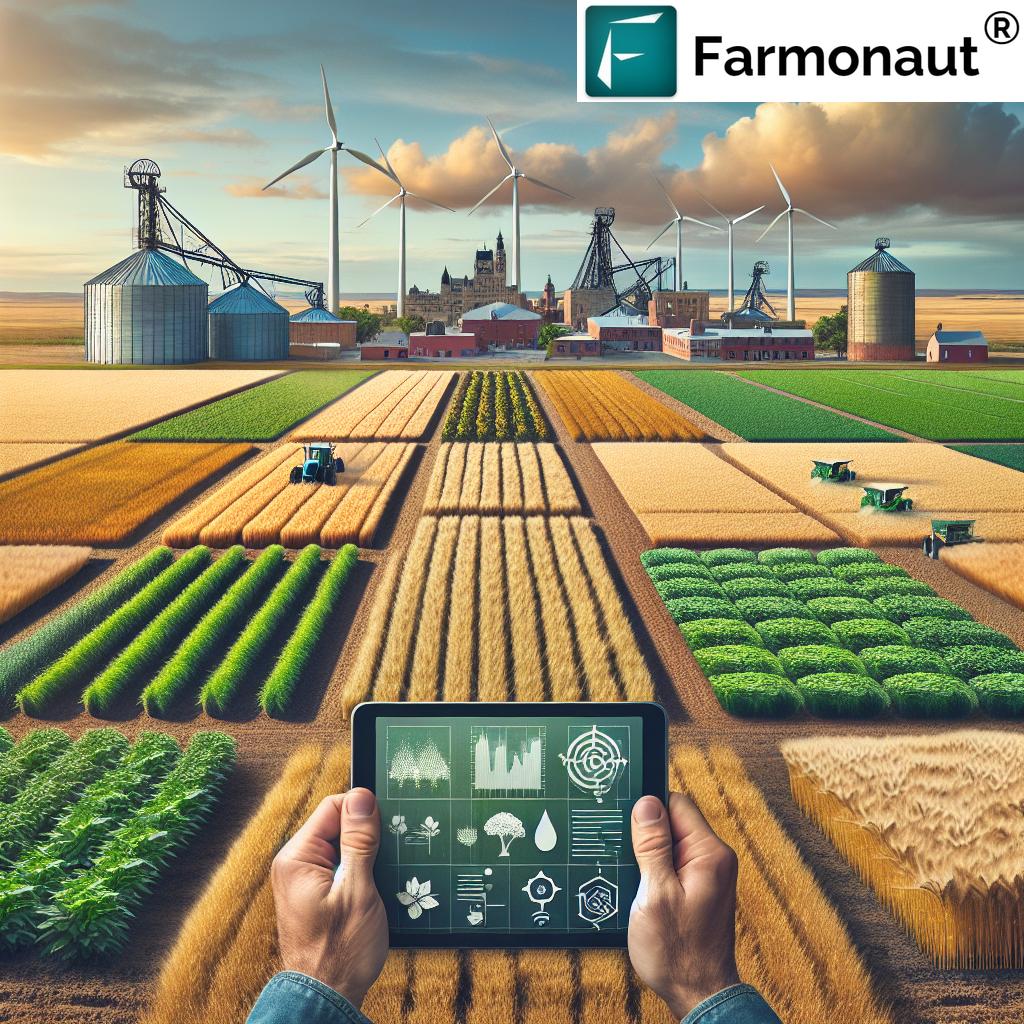Sustainable Agriculture Revolution: How Kansas Farmers Are Embracing Regenerative Practices for a Greener Future
“Consumer demand for sustainably sourced products is rising, with 3 key concerns: water conservation, soil health monitoring, and ethical ingredient sourcing.”
In the heartland of America, a quiet revolution is taking place. Kansas farmers, known for their resilience and innovation, are at the forefront of a sustainable agriculture movement that’s reshaping the future of food production. We’re witnessing a paradigm shift as these growers embrace regenerative farming techniques, prioritizing soil health, water conservation, and ethical ingredient sourcing. This blog post delves into the transformative practices being adopted across the Sunflower State and explores how they’re contributing to a greener, more sustainable future for agriculture.
The Rise of Regenerative Agriculture in Kansas
Regenerative agriculture is more than just a buzzword; it’s a holistic approach to farming that aims to improve soil health, enhance biodiversity, and sequester carbon. In Kansas, farmers are increasingly recognizing the long-term benefits of these practices, not only for the environment but also for their bottom line.
- Soil Health Monitoring: Kansas farmers are implementing advanced soil health monitoring techniques to understand and improve their soil’s biological, chemical, and physical properties.
- Water Conservation: With water scarcity becoming a pressing issue, innovative irrigation methods and water-saving practices are being adopted across the state.
- Carbon Sequestration: By implementing cover crops and no-till farming, Kansas farmers are contributing to carbon sequestration, effectively turning their fields into carbon sinks.
These practices align with the growing consumer demand for sustainably sourced products, as revealed by recent research from Ardent Mills. Consumers are becoming increasingly aware of sustainability-related concepts, with water conservation, soil health, and ethical ingredient sourcing topping their list of concerns.

The Role of Technology in Sustainable Farming
As Kansas farmers transition to more sustainable practices, technology plays a crucial role in facilitating this shift. Advanced agricultural technologies are making it easier for farmers to implement and monitor regenerative practices effectively.
At Farmonaut, we’re proud to contribute to this revolution by providing cutting-edge satellite-based farm management solutions. Our platform offers real-time crop health monitoring, AI-based advisory systems, and resource management tools that support farmers in their sustainability efforts.
Farmonaut’s satellite imagery and AI-driven insights help Kansas farmers make informed decisions about irrigation, fertilizer usage, and pest management. This technology-driven approach not only optimizes crop yields but also reduces resource wastage, aligning perfectly with the principles of sustainable agriculture.
Explore Farmonaut’s solutions:
Perennial Grains: A Game-Changer for Sustainable Agriculture
“Perennial grains in food products show potential for carbon sequestration, contributing to improved agricultural sustainability across 2 critical areas.”
One of the most exciting developments in sustainable agriculture is the incorporation of perennial grains into food products. Organizations like The Land Institute, based in Salina, Kansas, are at the forefront of this movement, advocating for the use of perennial grains like Kernza in commercial food production.
Perennial grains offer several advantages over annual crops:
- Reduced soil disturbance, leading to improved soil health
- Enhanced carbon sequestration capabilities
- Decreased need for inputs like fertilizers and pesticides
- Improved water retention and reduced erosion
The Land Institute has introduced the Perennial Percent label, allowing products containing at least 1% Kernza to signify their commitment to sustainable sourcing. This initiative is gaining traction among food manufacturers and resonating with environmentally conscious consumers.
Sustainable Crop Rotation: Balancing Productivity and Conservation
Kansas farmers are increasingly adopting sustainable crop rotation practices to enhance soil health, manage pests naturally, and improve overall farm productivity. This approach involves strategically alternating crops in a given field to maximize nutrient cycling and minimize pest pressure.
Key benefits of sustainable crop rotation include:
- Improved soil structure and fertility
- Reduced reliance on synthetic fertilizers and pesticides
- Enhanced biodiversity on the farm
- Increased resilience to climate variability
By implementing these rotations, Kansas farmers are not only improving their yields but also contributing to the long-term sustainability of their land and the surrounding ecosystem.
Water Conservation: A Critical Component of Sustainable Farming
In a state where water resources are precious, Kansas farmers are pioneering innovative water conservation techniques. From advanced irrigation systems to drought-resistant crop varieties, the focus is on maximizing water use efficiency without compromising crop yields.
Some of the water conservation strategies being implemented include:
- Precision irrigation systems guided by soil moisture sensors
- Adoption of drought-tolerant crop varieties
- Implementation of rainwater harvesting techniques
- Use of cover crops to improve soil water retention
These practices not only conserve water but also contribute to the overall sustainability of Kansas agriculture, ensuring that farmers can continue to produce bountiful harvests even in the face of changing climate conditions.

The Power of Data in Sustainable Agriculture
In the digital age, data management and analytics play a crucial role in tracking progress and informing decision-making in sustainable agriculture. Kansas farmers are leveraging advanced data collection and analysis tools to optimize their operations and measure the impact of their regenerative practices.
Farmonaut’s platform contributes to this data-driven approach by providing:
- Real-time satellite imagery for crop health monitoring
- AI-powered insights for precision farming
- Data analytics for resource optimization
- Blockchain-based traceability for supply chain transparency
Explore Farmonaut’s API for advanced agricultural data integration:
Overcoming Challenges in Implementing Sustainable Practices
While the benefits of sustainable agriculture are clear, Kansas farmers face several challenges in implementing these practices. A survey by YouGov highlighted that 52% of farmers cite costs as the biggest obstacle to adopting climate-smart agricultural approaches.
Key challenges include:
- Initial financial investment in new equipment and technologies
- Need for technical assistance and education on regenerative practices
- Time required for soil health improvements to translate into yield gains
- Market uncertainties and fluctuating commodity prices
To address these challenges, various initiatives are emerging to support farmers in their transition to more sustainable practices. These include training programs, financial incentives for carbon sequestration, and partnerships between farmers, food manufacturers, and technology providers.
The Role of Consumer Awareness in Driving Change
Consumer demand for sustainably sourced products is a powerful driver of change in the agricultural sector. As revealed by Ardent Mills’ research, 57% of consumers express a need for more information to make educated decisions about sustainable food choices.
This growing awareness presents both a challenge and an opportunity for Kansas farmers. By adopting sustainable practices and effectively communicating their efforts, farmers can tap into this growing market demand and potentially command premium prices for their sustainably produced crops.
Comparison: Traditional vs. Regenerative Farming Practices
| Farming Aspect | Traditional Approach | Regenerative Practice | Environmental Impact | Estimated Cost Savings |
|---|---|---|---|---|
| Soil Management | Intensive tillage, synthetic fertilizers | No-till, cover crops, organic amendments | Improved soil health, increased carbon sequestration | 20-30% reduction in fertilizer costs |
| Water Usage | Conventional irrigation systems | Precision irrigation, drought-resistant crops | Reduced water consumption, improved water quality | 15-25% reduction in water costs |
| Pest Control | Heavy reliance on chemical pesticides | Integrated Pest Management (IPM), biological control | Reduced chemical runoff, increased biodiversity | 30-40% reduction in pesticide costs |
| Crop Diversity | Monoculture farming | Crop rotation, intercropping | Enhanced ecosystem resilience, improved soil fertility | 10-20% increase in overall farm profitability |
| Energy Use | High fossil fuel dependency | Renewable energy integration, reduced tillage | Lower greenhouse gas emissions | 25-35% reduction in energy costs |
The Future of Sustainable Agriculture in Kansas
As we look to the future, the trajectory of sustainable agriculture in Kansas is promising. The combination of innovative farming practices, advanced technologies, and growing consumer awareness is paving the way for a more resilient and environmentally friendly agricultural sector.
Key trends shaping the future include:
- Increased adoption of precision agriculture technologies
- Growing market for sustainably produced food products
- Development of climate-resilient crop varieties
- Integration of renewable energy in farm operations
- Expansion of regenerative agriculture education and training programs
By embracing these trends and continuing to innovate, Kansas farmers are not only securing their own future but also contributing to global efforts to create a more sustainable food system.
Conclusion: A Greener Future for Kansas Agriculture
The sustainable agriculture revolution in Kansas is more than just a trend; it’s a necessary evolution of farming practices to meet the challenges of the 21st century. As we’ve explored in this blog post, Kansas farmers are at the forefront of this movement, implementing regenerative practices that benefit their land, their bottom line, and the planet as a whole.
From soil health monitoring to water conservation, from perennial grains to data-driven decision-making, the strategies being adopted across the state are diverse and impactful. While challenges remain, the commitment of Kansas farmers to sustainable agriculture, supported by innovative technologies and growing consumer awareness, paints a hopeful picture for the future of food production.
As we continue to support and celebrate these efforts, we’re not just witnessing a change in farming practices – we’re seeing the birth of a more sustainable, resilient, and ethical food system that will benefit generations to come.
FAQs
- What is regenerative agriculture?
Regenerative agriculture is a holistic farming approach that focuses on improving soil health, enhancing biodiversity, and sequestering carbon. It includes practices like no-till farming, cover cropping, and rotational grazing. - How does sustainable agriculture benefit Kansas farmers?
Sustainable agriculture practices can lead to improved soil health, reduced input costs, increased resilience to climate variability, and potential premium prices for sustainably produced crops. - What role does technology play in sustainable farming?
Technology, such as Farmonaut’s satellite-based farm management solutions, helps farmers implement precision agriculture techniques, monitor crop health in real-time, and make data-driven decisions to optimize resource use. - What are perennial grains, and why are they important?
Perennial grains are crops that live for multiple years without needing to be replanted annually. They offer benefits like improved soil health, enhanced carbon sequestration, and reduced need for inputs. - How can consumers support sustainable agriculture in Kansas?
Consumers can support sustainable agriculture by choosing products with sustainability certifications, learning about farming practices, and supporting local farmers who implement regenerative techniques.






